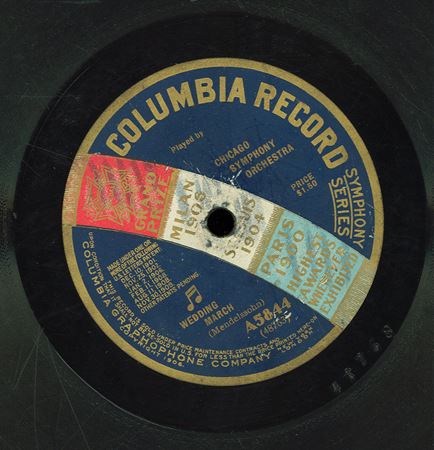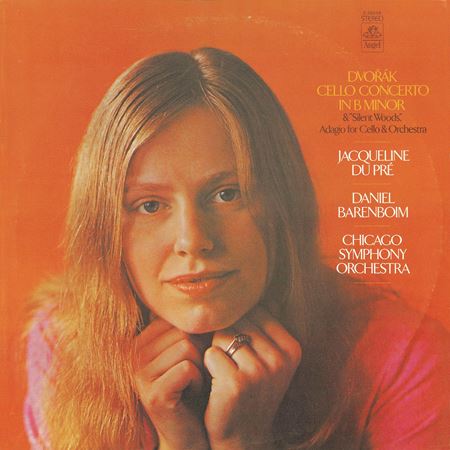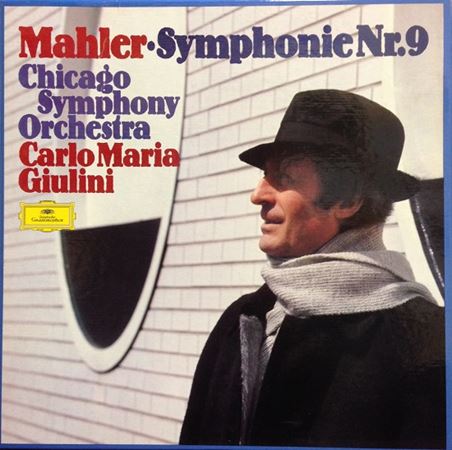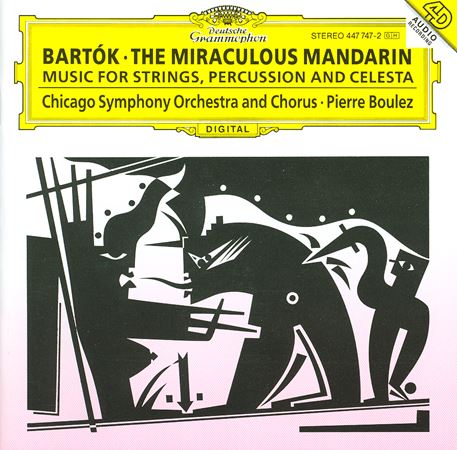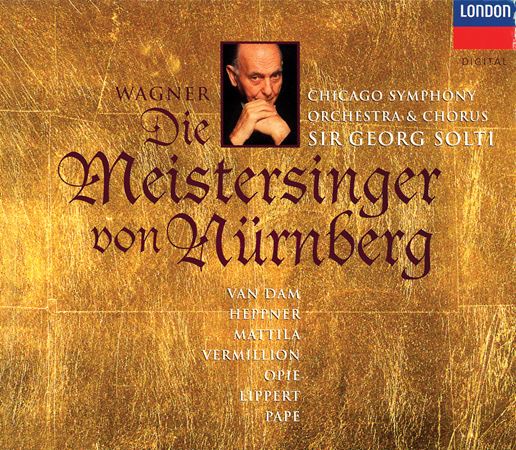Frank Villella has been a member of the staff of the CSOA's Rosenthal Archives since 1993.
© Todd Rosenberg Photography
The Chicago Symphony Orchestra’s commercial recording legacy began on May 1, 1916, when second music director Frederick Stock led the Wedding March from Mendelssohn’s A Midsummer Night’s Dream for the Columbia Graphophone Company. The Orchestra has since amassed an extraordinary, award-winning discography on a number of labels — including Angel, CBS, Deutsche Grammophon, Erato, London/Decca, RCA, Sony, Teldec, Victor and others — continuing with releases on the in-house label CSO Resound under tenth music director Riccardo Muti. For My Favorite CSO, we asked members of the Chicago Symphony family for their favorite recordings (and a few honorable mentions) from the Orchestra’s discography.
Frank Villella has been a member of the Chicago Symphony Orchestra Association’s Rosenthal Archives’ staff since 1993, serving as archivist since 2002 and director since 2014. For the Association, he has coproduced several compilations of archival sound recordings; written for the CSO’s program book and syndicated radio broadcasts; and contributed research to Sir Georg Solti’s Memoirs and biographies of Margaret Hillis, Jacqueline du Pré, Isaac Stern, Bruno Walter and Carlo Maria Giulini. Villella is the author of Chicago Symphony Orchestra: 125 Moments and the From the Archives blog. Also an active musician, he was a 20-year veteran of the Chicago Symphony Chorus, where he served as a section leader and appeared on numerous recordings, including two Grammy Award winners: Wagner’s Die Meistersinger von Nürnberg, conducted by Solti, and Verdi’s Requiem, conducted by Riccardo Muti. Villella is chair emeritus of the board of directors for the Collaborative Arts Institute of Chicago and a board member of the Solti Foundation US.
"As a member of the Chicago Symphony Chorus for 20 seasons, I regularly had one of the best seats in the house, and as a member of the staff of the Rosenthal Archives for nearly 30 years, I’ve been fortunate to be immersed daily in this remarkable organization’s history. As I considered the list below, I happily realized that they all related to ’firsts.’”
MENDELSSOHN Wedding March from Incidental Music to A Midsummer Night’s Dream, Op. 61
Recorded in 1916 (location unknown) for Columbia Graphophone Company
Frederick Stock conductor
"Yep, I picked this one, the Orchestra’s first recording. Even with all the scratches, you can hear clarity and vibrancy, nuance and majesty. Considering recording technology at the time, it’s likely that this was a reduced roster, but there is no documentation indicating exactly who participated. We do know that in the 1915–16 season, almost 60% of the Orchestra were musicians who were hired by and played under founder and first music director Theodore Thomas — including charter principals Bruno Steindel (cello), Joseph Schreurs (clarinet) and Leopold de Maré (horn), among numerous others. In addition to Frederick Stock’s achievement of leading this first recording, hearing it also gives us a sense of what the Orchestra might have sounded like under Thomas. I love that."
DVOŘÁK Cello Concerto in B Minor, Op. 104
Recorded in Medinah Temple in 1970 for Angel
Daniel Barenboim conductor
Jacqueline du Pré cello
"For many years, one of our volunteers in the Archives was Teresa Ameling (who had been the longtime secretary to former general manager John Edwards), and she loved telling us about picking up ’Danny and Jackie’ at the airport. I was certainly aware of du Pré’s remarkable playing, but hearing Teresa’s stories humanized her so much. Du Pré was soloist during Pierre Boulez’s debut residency in February 1969; Georg Solti’s first concerts as the Orchestra’s eighth music director later that November included her in Dvořák’s concerto; and a year later, on November 4, 1970, Barenboim made his conducting debut with the CSO at Michigan State University, and the first piece on the program was Dvořák’s Cello Concerto. This was his first recording with the CSO.
"Just listen to her entrance, about three-and-a-half minutes into the first movement. There’s something so immediate, so urgent about her playing (it’s very similar to her iconic recording of Elgar’s Cello Concerto, made five years earlier with Sir John Barbirolli and the London Symphony Orchestra). Du Pré has something to say; she demands your attention and keeps it.
"In his autobiography, Barenboim wrote that she had the gift of ’making you feel that she was actually composing the music as she was playing.’ I definitely feel that every time I hear this performance. Of all of the CSO’s recordings, this is easily the one I’ve listened to the most."
MAHLER Symphony No. 9 in D Major
Recorded in Medinah Temple in 1976 for Deutsche Grammophon
Carlo Maria Giulini conductor
1977 Grammy Award for Best Orchestral Performance
“Shortly after I began working in the Archives, we put the finishing touches on A Tribute to Carlo Maria Giulini, the ninth CD release of archival radio broadcasts for the Orchestra’s annual Symphonython fundraiser. I didn’t know much about Giulini, but I quickly learned how highly veteran Orchestra and Chorus members regarded him; some of them would even swoon, ’ah, Giulini,’ at the mention of his name. After I listened to many of his recordings — especially Mahler’s Ninth — I understood why.
"All three of the CSO’s recordings of Mahler’s Ninth Symphony have received the Grammy Award for Best Orchestral Performance. However, the work sounds like three different pieces under each conductor. I had heard Solti’s recording many times during college, and there’s an underlying tension that drives the performance forward. I was in awe of Boulez’s recording (I heard him lead the work in concert just before the recording sessions), and it’s so remarkably transparent, almost like chamber music in many sections. But there’s something about Giulini’s version; he approaches Mahler’s sprawling masterpiece with such profound resolution, a perfect sense of inevitability. It’s simply magical."
BARTÓK The Miraculous Mandarin, Op. 19
Recorded in Orchestra Hall in 1994 for Deutsche Grammophon
Pierre Boulez conductor
Chicago Symphony Chorus
Duain Wolfe director
"As a member of the Chorus, this was my first opportunity to sing under Pierre Boulez, but I almost didn’t get on the 40-voice roster; it was my first season as a full professional member, and I was low on the totem pole. As luck would have it, a fellow tenor had to drop out at the last minute, and Duain Wolfe offered me a spot on the afternoon of the first rehearsal. The Chorus really doesn’t have much to do (the brief choral part is wordless), but we had the best seats in the house to watch Boulez bring Bartók’s pantomime ballet to life.
“The most astonishing thing about the whole experience was his rehearsal process, watching him guide us through that amazingly complex score. There was so much mutual respect when Boulez was on the podium; everyone sat up and strived to do better than our best, and I felt that coming right back from him. I remember that so clearly whenever I listen to this recording.”
WAGNER Die Meistersinger von Nürnberg
Recorded in Orchestra Hall in 1995 for London
Sir Georg Solti conductor
Karita Mattila soprano
Iris Vermillion mezzo-soprano
Ben Heppner, Herbert Lippert, Roberto Saccà, John Horton Murray and Steven Tharp tenors
Alan Opie, Gary Martin and Richard Byrne baritones
José van Dam, Albert Dohmen, Kevin Deas, Stephen Morscheck and Kelly Anderson bass-baritones
René Pape bass
Chicago Symphony Chorus
Duain Wolfe director
1997 Grammy Award for Best Opera Recording
"I was a student the first time I heard the Chicago Symphony Orchestra and Chorus in concert, at the Centennial Gala in October 1990. Miraculously, a friend shared an extra artist comp (for a portion of the concert, I sat next to Lorin Maazel!), and the first thing on that program was the Prelude to Wagner’s Die Meistersinger von Nürnberg led by Sir Georg Solti. Five years later, I was working in the Archives, and one of my projects was collaborating with the Recording Academy to prepare Solti’s lifetime achievement tribute for the Grammy telecast, and it was to include clips from The Golden Ring (the 1964 video of his recording of Götterdämmerung in Vienna). During that same time, the Chorus was in rehearsal for Meistersinger, and I also was tasked with preparing the libretto for the performances (entering the English and German texts and editing the 100+ pages of the booklet). I was immersed in Sir Georg’s Wagner.
"82-year-old Solti then looked a bit different than 52-year-old Solti in The Golden Ring video, but the drive was exactly the same. He knew what he wanted and knew how to get it out of us. Because the Chorus sings in each act, we were onstage for the entire performance; and because we had been rehearsing for months, our parts had easily been memorized. Everything was recorded — two open dress rehearsals and four concerts (plus postconcert patch sessions), yielding three complete performances of Wagner’s three-act, nearly five-hour opera. The time flew by.
"The four-disc set was finally released two years later, shortly before Solti’s death in September 1997. On February 25, 1998, the recording was awarded the Grammy for Best Opera Recording. It was Solti’s 31st and final award from the Recording Academy, and (for now) he remains the all-time Grammy champ."
A few honorable mentions:
- BARBER The Lovers with Andrew Schenck for Koch (1991)
- BARTÓK Bluebeard’s Castle with Pierre Boulez, Jessye Norman and László Polgár for Deutsche Grammophon (1993) – “I went to all three performances of this. It was absolutely breathtaking!”
- BEETHOVEN Missa solemnis in D Major, Op. 123 with Sir Georg Solti for London (1977)
- BEETHOVEN Piano Concertos nos. 4 and 5 with Frederick Stock and Artur Schnabel for RCA (1942)
- BERLIOZ Les nuits d’été, Op. 7 with Fritz Reiner and Leontyne Price for RCA (1963)
- BRAHMS A German Requiem with Daniel Barenboim for Erato (1992) – “This was my first time singing in Orchestra Hall and first recording with the Chorus. I had to keep pinching myself.”
- CORIGLIANO Symphony No. 1 with Daniel Barenboim for Erato (1989) – “I attended the open rehearsal for this, and it was the first time I had the chance to hear the CSO perform live.”
- DVOŘÁK Symphony No. 9 in E Minor, Op. 95 (From the New World) with Sir Georg Solti for London (1983) – “This was my first CSO recording, a gift from my college roommate.”
- GÓRECKI Miserere with John Nelson for Nonesuch (1994) – “This was the first time the Chorus made a commercial recording without the CSO.”
- HINDEMITH Symphonic Metamorphosis on Themes by Weber with Rafael Kubelík for Mercury (1953)
- MAHLER Das Lied von der Erde with Fritz Reiner, Maureen Forrester and Richard Lewis for RCA (1959)
- MAHLER Symphony No. 9 with Pierre Boulez for Deutsche Grammophon (1995)
- MARTINON Symphony No. 4 (Altitudes) with Jean Martinon for RCA (1967)
- PAGANINI/Stock Moto perpertuo, Op. 11 with Frederick Stock for Columbia (1941)
- POULENC Gloria with Bernard Haitink for CSO Resound (2007)
- RESPIGHI Pines of Rome with Fritz Reiner for RCA (1959)
- SHOSTAKOVICH Symphony No. 7 in in C Major, Op. 60 (Leningrad) with Leonard Bernstein for Deutsche Grammophon (1988)
- STRAUSS Four Last Songs with Sir Georg Solti and Lucia Popp for London (1977)
- STRAVINSKY Symphony of Psalms with Sir Georg Solti for London (1997)
- TCHAIKOVSKY Violin Concerto in D Major, Op. 35 with Désiré Defauw and Erica Morini for RCA (1945)
- VERDI Messa da Requiem with Riccardo Muti for CSO Resound (2009) – “This was the first time the Chorus performed with Muti. An extraordinary, eye-opening experience.”
- VERDI Messa da Requiem with Sir Georg Solti for RCA (1977)
- VERDI Otello with Riccardo Muti for CSO Resound (2012)
- WAGNER Prelude and Liebestod from Tristan and Isolde with Artur Rodzinski for RCA (1947)
- WILLIAMS Lincoln with John Williams for Sony (2012) – "The Chorus only sings on two tracks, and at the session, the engineers announced that they had everything they needed after only a couple of takes. Steven Spielberg was standing close to the podium, and Williams turned to him and said, ’I should have written more for the Chorus.’"
MFC-046
